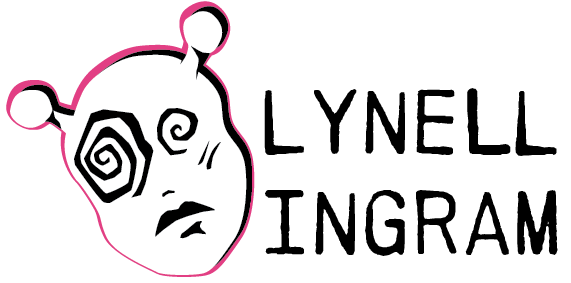Did you know that in the US, more than 1 in 5 women experienced a mental health condition in the last year?* Does that seem high to you? If so, it might be that we are doing too 'good' of a job at hiding, ignoring, and not recognizing when we need support the most.
Hello friends, and welcome to my first blog post on this website! If we haven't met, I'm Lynell Ingram and, in a nutshell, I'm an artist that makes paintings that destigmatize women's mental health issues. If you have been following my artwork for a while, thank you! I invite everyone to subscribe to my Exclusive Collectors Circle newsletter where I’ll send out updates on new weekly blog posts as well as new artwork.
So why am I here having this conversation with you? I've always used my artwork to talk about and process difficult things. Even long before I realized that that was what I was doing. When I couldn't understand what I was feeling or struggling with, it always found a way out through my paintings. Looking back on work I was creating 15-20 years ago, it's painfully obvious, but I was oblivious while I created it.

'Am I OK?,' Circa 2007, Digital Art. Yikes, man.
Since then, my work has evolved quite a bit. And I have learned a lot about myself through some very difficult experiences. Now I can use visual language to talk about things with a lot more intention. Most of my work comes back to mental health, neurodivergence, and issues that have a unique effect on women and non-binary people.

'Unnamed,' 2006, Acrylic on Canvas, 24x36"
But why do I choose to talk about these topics? So much of my adult life has been shaped by trauma and long undiagnosed mental health struggles. It still is, even though I now have more knowledge and tools to help me. Several years ago I hit a breaking point before I was able to recognize that I needed help and started to seek it out. I'd like to share my experiences and what I've learned along the way to help others.

'We Are OK,' 2021, Mixed Media, 9x12" (regarding the stigma of diagnosis and treatment)
Nobody else should have to hit their own breaking point before they get help. Showing and talking about what it is like can lead others to recognize when their mental health is in trouble, and normalize it a bit more, because it is normal to struggle. I want to talk about what these experiences might look like and the unique challenges that women and non-binary folks face in diagnosis and treatment.
To start with, here are 5 important reasons that we need to be specifically talking about women’s mental health:
- Women are more likely to experience PTSD, twice as likely to experience Generalized Anxiety Disorder and/or Depression, and ten times as likely to experience an eating disorder. 10% of pregnant women and 13% of women who’ve recently given birth experience a form of Perinatal Depression, including Postpartum Depression. Women are also more likely to be diagnosed with Bipolar II Disorder as well as Borderline Personality Disorder. (1)
- Women are more likely to experience comorbid mental illnesses (two or more disorders occuring at the same time.) (1)
- While all people have the potential to experience the causes of mental illness, including trauma, our cultures, injury, and biology such as genetic predispositions, women have specific biologic factors related to our hormones as well as particular societal pressures. (1)
- Women and non-binary people, especially those of color, may be less likely than men to seek treatment after experiencing symptoms, partially from internalized or cultural stigmas, but also because many aren’t aware that their symptoms constitute a mental illness, or that treatment is available. (Not to mention access to care.) (1)
- Neurodivergence, such as ADHD and Autism (which are not technically considered mental illnesses, but often have mental health comorbidities or misdiagnosis’ that come along with them, so I’ll still talk about it quite a bit in this blog), are most likely to be diagnosed in women in their late 30’s and early 40’s, where for men the average age is 7. (2)
This is hardly an exhaustive list. Between hormone changes that we experience in puberty, then monthly, through pregnancies, and through perimenopause, plus a much higher statistical likelihood of experiencing violence** in our lives, we may be particularly vulnerable to experiencing mental health struggles.
This just goes to show how important to normalize candid conversations about mental health so we can tell when we, and strong women we love, our mothers, sisters, daughters, and friends, are struggling so we can get and help provide the support that we/they need. It's about taking care of each other as well as ourselves.
I'll be digging in much deeper to talk about women’s mental health topics, sharing resources and tips that I find along the way, trying to destigmatize our experiences, and talking about how I use my artwork to talk directly about women's mental health issues. You can see my paintings that are currently available to purchase here.
I also offer Mental Health Matterz merch including empowering and funny stickers, mugs, and shirts that you can peruse here. Lot's more coming soon.
I’m also on Instagram @lynellingram, where I post quick topics and thoughts about women’s mental health and my artwork, so be sure to follow along!
*OASH (Office on Women's Health from the US Department of Health & Human Services.)
**UN Women, Facts and Figures: Ending Violence Against Women
(1) Regis College, Women's Mental Health 101: Statistics, Symptoms & Resources
(2) McPin Foundation, Neurodiversity in Women
